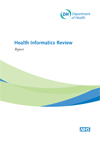 This review has been taking place alongside the NHS Next Stage Review (NSR) and reflects the informatics requirements of that review. Groups of staff, patients, carers and the public have been looking at clinical pathways and new ways of providing care. There are needs to support access and choice, the involvement of patients and the public and to meet increasing expectations. These make this the appropriate time for a review of information requirements and how information is provided. The review is also timely because of the technological advances and the rise of the importance of information to society in general.
This review has been taking place alongside the NHS Next Stage Review (NSR) and reflects the informatics requirements of that review. Groups of staff, patients, carers and the public have been looking at clinical pathways and new ways of providing care. There are needs to support access and choice, the involvement of patients and the public and to meet increasing expectations. These make this the appropriate time for a review of information requirements and how information is provided. The review is also timely because of the technological advances and the rise of the importance of information to society in general. The Health Informatics Review was therefore commissioned by the NHS Chief Executive and the Department of Health Permanent Secretary to:
- assess the supply of, and demand for, information across the NHS and social care, so that the data collected can be used to provide valuable and relevant information;
- make sure that, five years after the commissioning of the National Programme for IT, the framework for the NHS Care Records Service and the Secondary Uses Service (SUS) is in line with recent, current and potential future policy;
- make sure that the governance of informatics within the NHS and the Department of Health (DH) is clear and appropriate, and supported by the right management structure.
Download Health Informatics Review Report (.pdf, 717 KB).
Download from the eHealthNews.EU Portal's mirror: Health Informatics Review Report (.pdf, 717 KB).
For further information, please visit:
http://www.dh.gov.uk